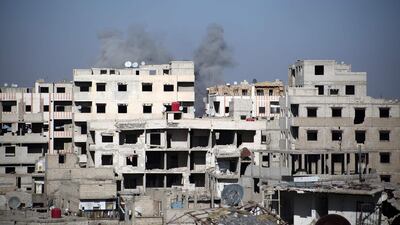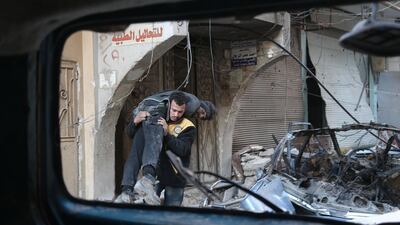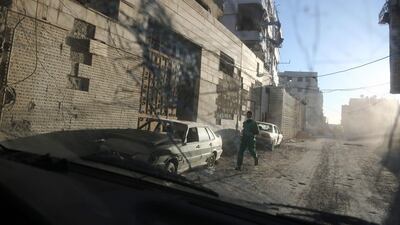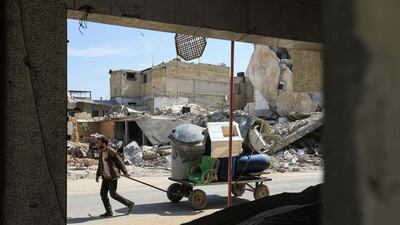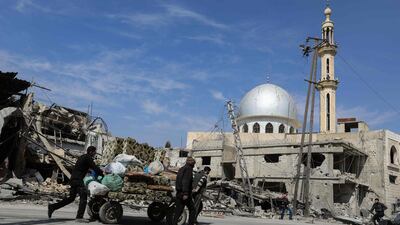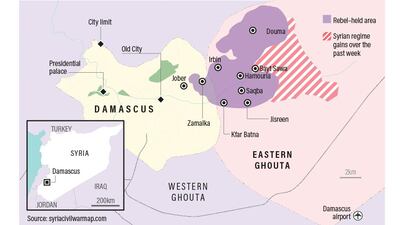The Syrian government advanced further against rebels near Damascus on Thursday as the death toll in its two-week-old offensive rose to more than 900 and residents described increasingly dire conditions.
The fighting also prevented a delivery of aid to Eastern Ghouta, where between 300,000 and 400,000 people are under siege by the government forces attempting to bisect the rebel-held area.
According to the Syrian Observatory for Human Rights, more than 900 people have been killed since February 18, when the government’s forces intensified air and artillery strikes in preparation for a ground invasion.
Many residents have spent most of the past two weeks in basements that have become makeshift bomb shelters. Though the United Nations Security Council has called for an immediate ceasefire, none has materialised. An alternative measure, a five-hour daily pause in hostilities proposed by the Russian government, has also failed.
“Ghouta is paralysed. People are nervous,” said Humam Husari, a filmmaker who said he and his wife had taken shelter in a basement with about 70 other people. “We are unable to move at all.”
“This morning I just went out for a few minutes. The destruction is unbelievable,” he said. “You don’t really walk on the ground, you just walk on rubble. If I had a car or a bicycle I wouldn’t be able to use it. Ambulances are unable to evacuate the injured.”
Towns and villages have fallen in quick succession in recent days.
On Wednesday, government forces captured Beit Sawa, Al Ashaari, and nearby farmland, the Britain-based Observatory said, putting them in control of more than half the territory once held by rebels.
The advance came after hundreds of Afghan, Palestinian, and Syrian loyalist militiamen arrived in Eastern Ghouta to bolster the ground push, according to the Observatory.
The government’s advance has forced residents of the area to try to make space in already overcrowded shelters.
"Many people last night fled Hamouria to other places, so the basements are even more crowded," Husari said, referring to one of the towns now under government control.
Bara'a Abdulrahman, a young man in Douma, one of the largest towns in Eastern Ghouta, said he was sharing a 45-square-metre basement with 27 other families.
“There is a curtain in the middle separating women and children from men,” he said. “We sleep in a way similar to sleeping in the regime jails, where everyone lays on his side because there is not enough space.”
"Bakeries were bombed from the first day of the campaign. So there's no bread nor flour," Mr Abdulrahman said.
He said residents were using barley meant for cattle fodder instead. "We grind it and bake it in the basement. We use it as bread for the women and children. Sometimes we can find cheese or thyme. We make sandwiches and distribute to people,” he said.
“I hope there could be some solution to spare more blood,” he said. “Yesterday, one of my relatives lost his son.”
There were reports of negotiations between Russia and representatives of the two main rebel factions in the area to allow rebels and civilians to withdraw to other parts of Syria, as happened in the city of Aleppo in 2016.
Russia intervened on behalf of Syrian President Bashar Al Assad in 2015 and its air force has played a significant role in the offensive in Eastern Ghouta, an area known for farms and light industry. It offered safe passage earlier this week to residents wishing to leave the area, but none have taken the offer so far.
""I, like many people around me, have a house, a farm here. If I leave, where shall I stay? In a tent? We have very little choices," Mr Abdulrahman said. "Maybe death is the best option."
"Leaving Ghouta to the regime areas is more dangerous than staying here under daily bombardment. People want to stay and die in their land rather than leave and die in jails and under torture. So people are in between two bitter choices," said Basil Ayoun, a doctor in Douma. "The people believe in God and think he will come to help at the end of the day."
The Security Council met behind closed doors for three hours on Wednesday to discuss the failed truce, after France and Britain requested urgent talks.
Dutch Ambassador Karel van Oosterom, who holds the council presidency, said members had "expressed concern about the humanitarian situation" and reiterated calls for the ceasefire resolution to be implemented.
UN peace envoy Staffan de Mistura briefed the meeting and offered to help broker a deal with Russia to allow fighters in Eastern Ghouta to leave, a diplomat said, adding that diplomats supported the idea as a way to halt the violence.
_____________________
UN Syria aid chief voices frustration at failure to stop war
Aid convoy abandons Syria's Eastern Ghouta amid bombardment
_____________________
UN human rights chief Zeid Ra'ad Al Hussein said the Syrian regime and its foreign allies were already planning their next "apocalypse".
"This month, it is Eastern Ghouta which is, in the words of the secretary general, hell on earth," he said.
"Next month or the month after, it will be somewhere else where people face an apocalypse - an apocalypse intended, planned and executed by individuals within the government, apparently with the full backing of some of their foreign supporters."
_______________
Hassan Hassan comment: The Syrian conflict is, even now, delivering game-changing surprises
_______________
Eastern Ghouta's roughly 400,000 residents have lived under government siege since 2013, facing severe shortages of food and medicines even before the latest offensive began.
Forty-six aid trucks entered the area on Monday for the first time since the offensive, but only 32 were unloaded before deliveries were stopped because of heavy bombardment.
Syrian authorities also removed some medical and health supplies from the trucks, the United Nations said.
Dr Ayoun said people were doing their best to support one another, even though food has been scarce for months as the siege has tightened.
“They are sharing their food,” he said. “As people are staying with each other in the shelters, then if you have something to eat, you can’t eat it alone while people around you are watching.

